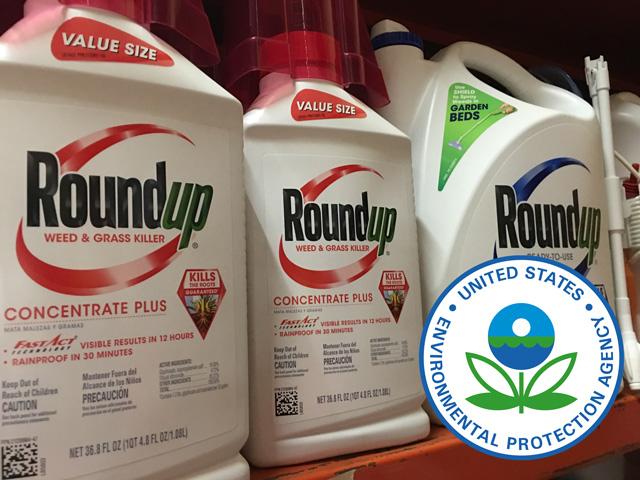States Seek EPA Action on Glyphosate
States to EPA: Declare State Glyphosate Labels Unlawful if Inconsistent With Federal Findings, Rules
LINCOLN, Neb. (DTN) -- State warning labels on products containing glyphosate that include information contrary to scientific findings from the U.S. Environmental Protection Agency would constitute misbranding, if the agency grants a new petition filed Wednesday by state attorneys general from 11 states.
Glyphosate is the active ingredient in Roundup that has been the subject of numerous product-liability lawsuits across the country alleging cancer links to the herbicide's use.
Juries have awarded billions of dollars in damages to alleged victims, although EPA and other governmental bodies around the world have maintained available science establishes no cancer connection.
On Wednesday, attorneys general from Iowa and Nebraska led the filing of the petition, joined by those from Alabama, Arkansas, Georgia, Indiana, Louisiana, Montana, North Dakota, South Dakota and South Carolina.
"Petitioners respectfully request EPA to declare that any state labeling requirements inconsistent with EPA's findings and conclusions from its human health risk assessment on human health effects, such as a pesticide's likelihood to cause cancer, birth defects, or reproductive harm, constitute misbranding under FIFRA (Federal Insecticide, Fungicide, and Rodenticide Act)," the states said in the petition.
"The proposed rule merely seeks to clarify ambiguity concerning misbranding under FIFRA."
FIFRA already prohibits states from enacting more stringent or even different labeling requirements than those imposed by EPA, the states said in the petition.
Although states have the authority to restrict the sale or use of pesticides within their borders, the petition said they "cannot impose or continue in effect any requirements for labeling or packaging in addition to or different from those required under FIFRA."
The states said the agency has "never formally codified the preemptive effect of its scientific findings developed during the registration process" as it relates to state statutes mandated health warnings or "under common-law failure-to-warn claims."
P[L1] D[0x0] M[300x250] OOP[F] ADUNIT[] T[]
In a statement to DTN, Bayer said it was "encouraged to see continued broad recognition and discussion on the importance of this topic for farmers and consumers alike -- and the need for a solution to this issue created by the litigation industry."
Bayer said as a company focused on research and development having a "stable environment able to support new and existing technologies" is "crucial for farmers and innovation."
When it comes to glyphosate, the states said the advantages to farmers using the chemical are "well documented." The attorneys general said the "uniformity" sought in the petition goes "far beyond" glyphosate.
"Glyphosate is merely the regulated pesticide that courts have considered in finding an ambiguity in FIFRA that the plain language of the statute does not support," the petition said.
"The court-made gap in FIFRA's regulatory framework affects countless other pesticides and fungicides currently regulated under FIFRA, including some still being developed. The flawed analysis could have downstream effects for other federally regulated labeling requirements."
NEEDED CLARITY
The 11 states that filed the petition point to state speech mandates such as in California that are "fundamentally at odds" with petitioners' consumer protection policies as reason for needed clarity from EPA.
"Most states have adopted legal provisions prohibiting businesses from branding their products with false or misleading statements," the states said.
"Yet California is seeking to compel companies to display labels on their products that are inconsistent with, and contrary to, the long-held position of EPA, not to mention a broad list of international organizations and regulatory bodies."
In 2023, U.S. Court of Appeals for the Ninth Circuit declared California's Proposition 65 warning for glyphosate to be unconstitutional because it wasn't based in science.
However, the states' petition said the "threat of labeling rules that differ by state" continues.
The European Commission announced in 2023 it would renew glyphosate's approval for 10 more years, after European Union states were unable to reach a majority opinion on an extension.
In 2015, the World Health Organization cancer research agency concluded glyphosate was "probably carcinogenic" to humans. That conclusion stands in contrast to many agencies around the world, including EPA that classifies the chemical as non-carcinogenic.
Read more on DTN:
"Court Blocks Calif. Glyphosate Warning," https://www.dtnpf.com/…
"Bayer Makes Case on Roundup Labels," https://www.dtnpf.com/…
Todd Neeley can be reached at todd.neeley@dtn.com
Follow him on social platform X @DTNeele
(c) Copyright 2024 DTN, LLC. All rights reserved.






